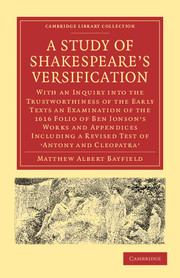 A Study of Shakespeare's Versification
A Study of Shakespeare's Versification Book contents
- Frontmatter
- PREFACE
- Contents
- ERRATA
- I SHAKESPEARE'S VERSIFICATION
- II THE EARLY TEXTS
- CHAPTER III ABOLITION OF RESOLUTIONS AND OTHER ABBREVIATIONS IN THE VERSE: Richard II and Richard III examined
- CHAPTER IV ABBREVIATIONS IN THE VERSE (continued): the Quarto Plays Hamlet, Othello, and Lear examined
- CHAPTER V ABBREVIATIONS IN THE VERSE (continued): the Folio Plays Macbeth, The Tempest, Cymbeline, Coriolanus, Antony and Cleopatra and Julius Caesar examined (Macb. p. 140, Temp. p. 154, Cymb. p. 160, Cor. p. 184, A. and C. p. 204, J. C. p. 226)
- CHAPTER VI ELISION IN THE FINAL FOOT
- CHAPTER VII ON CERTAIN SPELLINGS
- CHAPTER VIII ABBREVIATIONS IN THE PROSE
- CHAPTER IX CONCLUSIONS
- APPENDICES
- THE TRAGEDY OF ANTONY AND CLEOPATRA
- INDEX
CHAPTER IX - CONCLUSIONS
from II - THE EARLY TEXTS
Published online by Cambridge University Press: 01 June 2011
- Frontmatter
- PREFACE
- Contents
- ERRATA
- I SHAKESPEARE'S VERSIFICATION
- II THE EARLY TEXTS
- CHAPTER III ABOLITION OF RESOLUTIONS AND OTHER ABBREVIATIONS IN THE VERSE: Richard II and Richard III examined
- CHAPTER IV ABBREVIATIONS IN THE VERSE (continued): the Quarto Plays Hamlet, Othello, and Lear examined
- CHAPTER V ABBREVIATIONS IN THE VERSE (continued): the Folio Plays Macbeth, The Tempest, Cymbeline, Coriolanus, Antony and Cleopatra and Julius Caesar examined (Macb. p. 140, Temp. p. 154, Cymb. p. 160, Cor. p. 184, A. and C. p. 204, J. C. p. 226)
- CHAPTER VI ELISION IN THE FINAL FOOT
- CHAPTER VII ON CERTAIN SPELLINGS
- CHAPTER VIII ABBREVIATIONS IN THE PROSE
- CHAPTER IX CONCLUSIONS
- APPENDICES
- THE TRAGEDY OF ANTONY AND CLEOPATRA
- INDEX
Summary
The cumulative weight of the evidence set forth in the preceding pages is so overwhelming that prosecuting counsel is spared the necessity of addressing the court at any length as he asks for a verdict of ‘Guilty on all counts’ against the conspirators. The reader has had the facts placed before him both in summary and detail, and they speak for themselves. What, then, are the conclusions to which we seem to be compelled as the result of our somewhat tedious inquiry? They may be briefly stated as follows.
1. Abbreviations in the Prose.—It is impossible to believe that Shakespeare ever used the four-and-twenty suspected abbreviations in prose spoken by gentlefolk. He may perhaps have put some of them into the mouths of vulgar characters like servants and the Grave-digger in Hamlet, yet even this is improbable. Nowhere would they have been more in place than on the lips of Bottom and his friends in A Midsummer Night's Dream and of the roisterers and others in the First Part of Henry IV. Yet these plays, as they left his hands, must have been absolutely free from them. For no one, I imagine, will seriously contend that the three in the former and the six in the latter are genuine, unless he is also prepared to say that our greatest, having no fixed principles of composition, was subject to ridiculous caprices.
- Type
- Chapter
- Information
- A Study of Shakespeare's VersificationWith an Inquiry into the Trustworthiness of the Early Texts an Examination of the 1616 Folio of Ben Jonson's Works and Appendices including a Revised Test of 'Antony and Cleopatra', pp. 280 - 314Publisher: Cambridge University PressPrint publication year: 2009First published in: 1920
